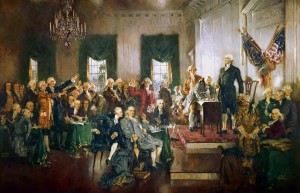
Multiple-Choice Questions.
To assess your knowledge and skills in government and politics answer these sample multiple-choice questions. Here are some knowledge and scenario questions. The correct answers will appear below the questions.
1. The phrase “all men are created equal and endowed by the creator with certain inalienable rights” can be found in which of the following documents?
(A) Constitution of 1787
(B) Bill of Rights
(C) Declaration of Independence
(D) Articles of Confederation
2. Which of the following is an accurate description of the “advice and consent” power in the Constitution?
(A) Is the Senate’s power to determine to convict or acquit impeached officials.
(B) Advice and consent Is the Supreme Court’s power to accept a case.
(C) The power refers to the lawmaking process; one house advises, the other consents.
(D) This power grants the Senate the power to recommend presidential appointments and to confirm or reject the same.
3. State law enforcement, or the state police, have discovered an accused criminal fugitive has departed their state and is hiding in an adjacent state. With the cooperation of the adjacent state’s police team, an arrest is made and the criminal defendant is returned to the original state for trial. Which of the following constitutional concepts allows for this process between governments?
(A) Full faith and credit
(B) Extradition
(C) Advice and consent
(D) Due process